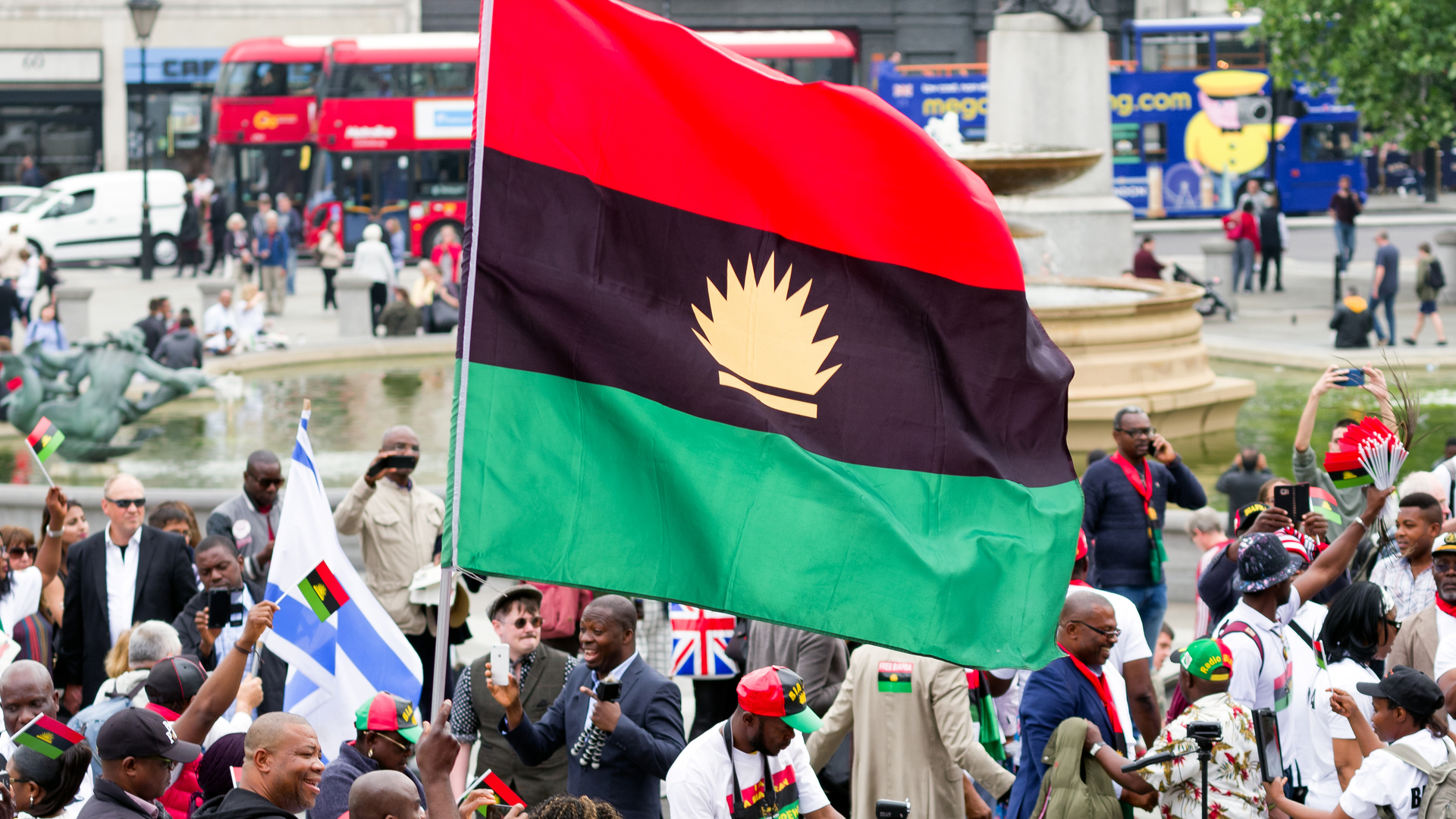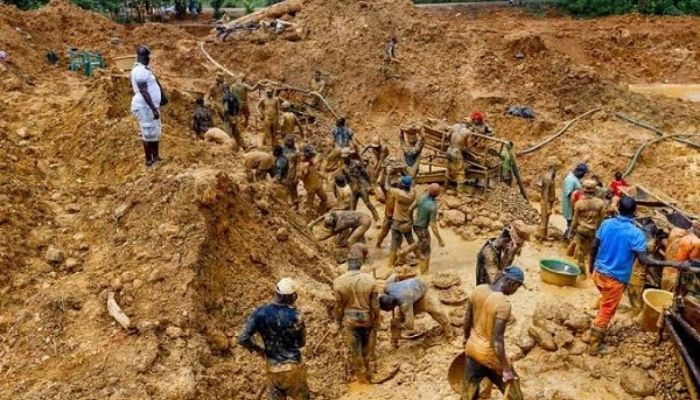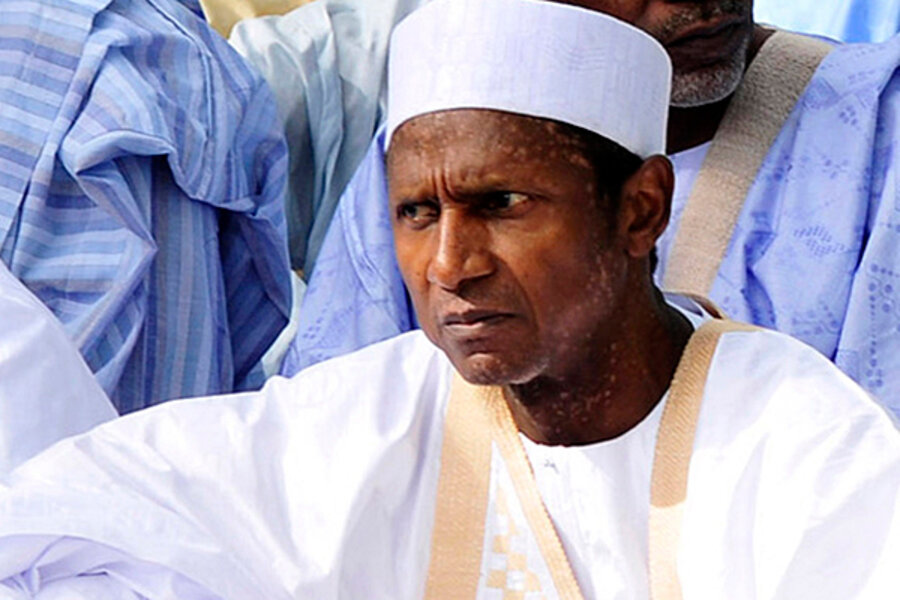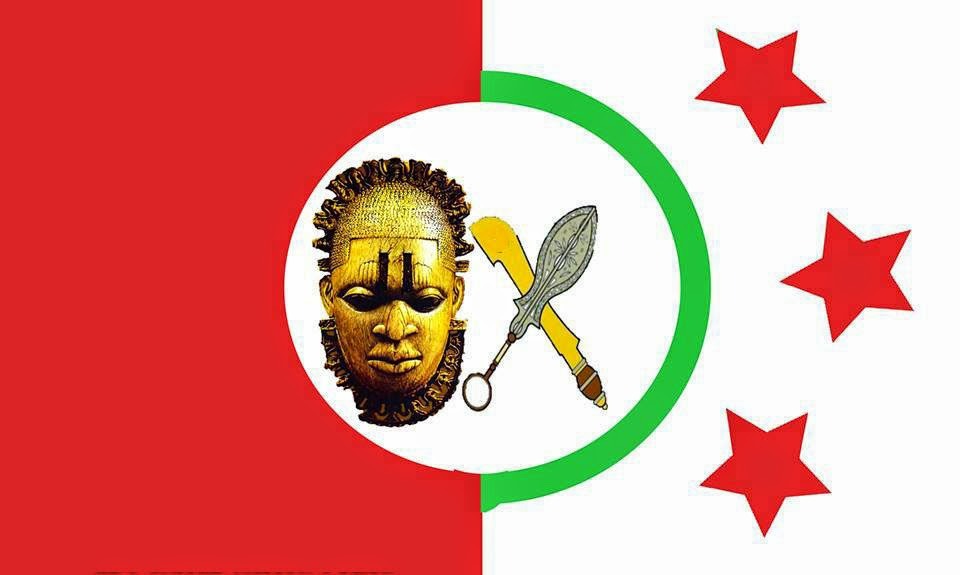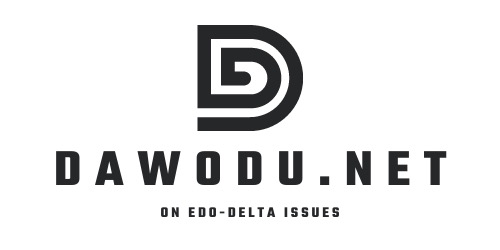JOSEPH AND HIS BROTHERS
Some “foreign” reporters have been in Nigeria, seing its “nakedness” - and have been reporting it.
So Jerry Gana has been angry.
Prof. Jerry Gana, Information Minister in Nigeria is a Christian. So is President Obasanjo, a born-again one. So it is apropos to start this essay with a wonderful Biblical story, about Joseph and His Brothers in Egypt.
It is from Genesis 42. I shall skip some details.
QUOTE
Joseph's Brothers Go to Egypt
1 When Jacob saw that there was grain in Egypt, Jacob said to his sons, "Why do you look at one another?"
2And he said, "Indeed I have heard that there is grain in Egypt; go down to that place and buy for us there, that we may live and not die."
3So Joseph's ten brothers went down to buy grain in Egypt. 4But Jacob did not send Joseph's brother Benjamin with his brothers, for he said, "Lest some calamity befall him." 5And the sons of Israel went to buy grain among those who journeyed, for the famine was in the land of Canaan.
6Now Joseph was governor over the land; and it was he who sold to all the people of the land. And Joseph's brothers came and bowed down before him with their faces to the earth. 7Joseph saw his brothers and recognized them, but he acted as a stranger to them and spoke roughly to them. Then he said to them, "Where do you come from?"
And they said, "From the land of Canaan to buy food."
8So Joseph recognized his brothers, but they did not recognize him. 9Then Joseph remembered the dreams which he had dreamed about them, and said to them, "You are spies! You have come to see the nakedness of the land!"
10And they said to him, "No, my lord, but your servants have come to buy food. 11We are all one man's sons; we are honest men; your servants are not spies."
12But he said to them, "No, but you have come to see the nakedness of the land." ………..
14But Joseph said to them, "It is as I spoke to you, saying, "You are spies!'……
The Brothers Return to Canaan
25 Then Joseph gave a command to fill their sacks with grain, to restore every man's money to his sack, and to give them provisions for the journey. Thus he did for them.
26So they loaded their donkeys with the grain and departed from there.
27But as one of them opened his sack to give his donkey feed at the encampment, he saw his money; and there it was, in the mouth of his sack.
28So he said to his brothers, "My money has been restored, and there it is, in my sack!" Then their hearts failed them and they were afraid, saying to one another, "What is this that God has done to us?" ……
35Then it happened as they emptied their sacks, that surprisingly each man's bundle of money was in his sack; and when they and their father saw the bundles of money, they were afraid.
UNQUOTE
It looks as if brother Jerry Gana has been reading the Old Testament again.
THE WOODSHED
Of course, you all now know where I am getting to. On Friday, February 8, 2002, angry Prof. Gana called in the foreign pressmen, particularly of CNN and SABC, to himself in Abuja to “berate” them (in Nigeria, “beration” is always used when a superior person talks harshly to someone he considers an inferior) for negative reporting. He was particularly incensed over-reporting in the aftermath of the Idi-Araba riots and Ikeja army dump explosion, irked for example over reports that suggested that many Nigerians were now in support of the military returning.
http://allafrica.com/stories/200202090005.html
Government Protests Foreign Media Coverage of Unrest
This Day (Lagos) Saturday, February 9, 2002
When the beration session was all over, unbeknownst to all of the reporters at the time – or was it only to some of them? - was stuffed along with each complimentary bag of government references an envelope, colored “brown”, containing a total of N50,000 notes, equivalent to $430. Not with dollar notes, mind you, according to some press reports, just local Naira notes.
“TELL-TALE” FARIS
Remember that this event occurred February 8. None of us outside of Jerry Gana himself, these reporters, the bureaucrats who stuffed the envelopes and the cashier who doled out the money, would have known anything about this until one “tell-tale” Mr. Stephen Faris of Time told “the whole truth” – or was it? – in an April 15 edition of the international magazine:
QUOTE
Time Magazine (International Edition) April 14, 2002
The whole truth
By Stephen Faris
CALL it journalism, Nigerian-style. After a recent CNN report suggested that Nigerians would welcome a return to military rule, a furious Ministry of Information official called members of the foreign press to Abuja, the capital, for a lecture on honest and accurate reporting. Following the admonition, which included requests for less negative news, each reporter was presented with a pack containing government reference books. Nestled in the same bag was a brown envelope stuffed with about $400. With the controversial presidential election in Zimbabwe over the 2003 elections in Nigeria - home to nearly one in six Africans - will be the next big test of democracy on the continent. Jerry Gana, the Minister of Information, emphasised this point last month when he kicked off a seminar organised by the Nigerian journalists' union to address standards in the media by promising: "Other governments have been arresting journalists and closing down media houses. This government will not do so. We believe that the success of this nascent democracy is in your hands." But a truly free press must be liberated not only from government oppression, but from the temptations of cash-filled envelopes like those issued by Gana's office.
Bribery is just one of the challenges Nigeria's press faces as the country makes the difficult transition from dictatorship to democracy. With well over a dozen national dailies and several weekly news magazines struggling for shelf space, Nigeria's press is one of the liveliest on the continent. It's resilient, too. Journalists played a vital role in the country's struggle for independence in 1960. After self-rule was established, Nigeria's newspapers and radio stations flourished and gained a reputation as the best in Africa. Reason enough, perhaps, for a series of military rulers to try to crush the press over a period of nearly 30 years. Papers were shut. Reporters were beaten, imprisoned, shot and blown up. Rather than buckle, though, the press went underground, writing in secret and printing at different plants every night.
When civilian rule returned in 1999, Nigerian journalists breathed a sigh of relief. Suddenly they could work relatively unharassed. But with their activist role gone, they've struggled not only to find a new purpose but even to define what journalism is. Pini Jason, publisher of The Examiner, a national daily believes the tradition of confrontation has hurt balanced and objective news reporting. Writers blend facts with opinion and pepper their reports with religiously or ethnically tinged speculation, fuelling tensions in the country. "Most of the things published here are not publishable internationally," he said.
Nigerian journalists admit they could use more training. But breaking the cycle of bribery will take more than just a lecture on journalistic ethics. Cash-filled envelopes are routinely handed out by government officials, oil companies, banks and just about anyone else giving a press conference. "Virtually all journalists are given," says Yinka Aderibigbe, who covers the Lagos State Governor for The Guardian, the country's best-selling paper. A typical press conference yields up to $15, more than half of most reporters' weekly salary. Editors have money delivered to their offices. A single source - a state government, for instance - might give a senior editor $200 every few months to ensure favourable coverage. Moreover, Nigeria's rulers have no experience of dealing with a free press. Government spokesmen often refuse interviews, and there is no freedom of information legislation to force official disclosure. To make matters worse, governors treat state television and radio as their mouthpieces. And harassment hasn't disappeared altogether. Independent journalists investigating corruption complain of intimidating anonymous phone calls.
The country's sporadic power supply and shoddy communications and transportation networks make publishing regularly a challenge. The Examiner's Jason, for instance, hasn't published his paper for more than a year. In those circumstances, journalists are in desperate need of an income. Plus poverty and an underfunded education system produce not only poorly-trained journalists, but also fewer readers. Still, there is some cause for hope. Christopher Meghai, a journalism teacher at the Times Journalism Institute in Lagos, left his reporting job to teach because he couldn't support himself without taking the brown envelopes. "I felt cheap," he says. "For how long will I have to survive that way?" How long? For as long as Nigeria's journalists rely on their story subjects as their paymasters.
UNQUOTE
Kai! It sure looked bad if true! Was this true? Was this a case of blatant bribery, or a bad case of poor judgement?
JERRY EXPLAINS
Let us read Brother Jerry’s response – ignore the title for now, it was untrue anyway, by roughly one week too early:
QUOTE
http://allafrica.com/stories/200204180652.html
2003: Obasanjo Declaration Date to Be Known Today
Daily Trust (Abuja)
April 18, 2002
…..materials deleted…
Prof. Gana, meanwhile, denied ever bribing foreign journalists during an interactive session held in February this year.
In a story in the April 15 edition of Time magazine (international) written by Stephen Faris, it was alleged that the Ministry of Information and National Orientation offered $400 each to foreign journalists invited for a lecture on "Honest and Accurate Reporting." Responding to the allegation, Professor Gana described it as rubbish, and an attempt to blackmail the present administration before the international community.
"Nobody can blackmail us whether national or internationally. It is absolute rubbish. What is $400?" he queried.
According to Prof. Gana, government had stated it categorically clear in the letter of invitation sent to the foreign journalists, dated February 6, 2002, that "arrangement has been made to cover their travel and incidental expenses, hence the decision to give each of them the sum of N50,000," being the estimated cost for return flight tickets from Lagos, hotel accommodation and inland transport in Lagos and Abuja.
The minister further explained in a statement, signed by his Personal Assistant (media), Mr. Sam Nwaobasi, that the Time magazine reporter, Mr. Stephen Faris, was not at the meeting, adding, "how he got his figure of $400 is what only he can explain."
UNQUOTE
Kai! Sure – I was born at midnight, but not last mid night….
Anyway, if it was not an attempted bribery, it was indeed bad judgement! This is the very kind of thing that president Obasanjo hates: making him look bad before the international community! He had just recovered from international Sufiya harrassment – and now this “Envelope-gate?”
PRESIDENTIAL RAGE
So the “enraged” president is threatening hail and brimstone on this one:
QUOTE
Nigeria Probes Alleged Bid to Bribe Foreign Press
April 19, 2002 12:16 PM ET
http://www.reuters.com/news_article.jhtml;jsessionid=W3NA4D0Z3S3VOCRBAE0CFFAKEEATGIWD?
LAGOS, Nigeria (Reuters) - Nigerian President Olusegun Obasanjo has ordered a probe into a U.S. magazine report that government officials tried to bribe Nigeria-based foreign journalists to influence their reporting of the country.
A presidential statement said Friday Obasanjo was "enraged by the report" in this week's edition of Time, and had ordered a full investigation.
"A detailed report will thereafter be presented to the president," Obasanjo's spokesman Tunji Oseni said in the statement.
"Anybody found liable by the investigation will be appropriately dealt with," Oseni said, recalling that
Obasanjo had been waging a war against graft since taking over from corrupt military rulers in 1999.
The Time report: "The Whole Truth -- Nigeria's culture of bribery threatens freedom of the press," centers on a Feb. 8 luncheon for foreign media representatives organized by Information Minister Jerry Gana.
Gana and his senior aides took turns at the meeting to berate foreign correspondents for their alleged biased reporting of ethnic and religious violence sweeping the country.
He singled out U.S. Cable News Network (CNN) for its reporting of tribal killings in Lagos a few days earlier.
Gana said Obasanjo's government was upset by what he called CNN's conclusion that most Nigerians preferred military rule because of the apparent inability of civilian authorities to clamp down on rising violence.
STUFFED ENVELOPES
Time's report of the meeting said: "Following the admonition, which included requests for less negative news, each reporter was presented with a pack containing government reference books. Nestled in the same bag was a brown envelope stuffed with about $400."
Reuters was at the luncheon but returned the cash as did several other journalists.
Gana has denied the insinuation of bribery, noting that Time's reporter Stephan Faris was not at the meeting, attended by about 20 journalists, more than half of them local representatives of foreign media.
Gana said in a statement that $430 "was handed over to invitees in the full glare of all the journalists and other guests present" to offset transport and hotel costs.
Most foreign journalists at the luncheon noticed the cash after the event, some when they opened the package on their return to their base in Lagos.
Gana acknowledged that some correspondents had returned the cash with explanations that they had already made their own hotel and transport arrangements in Abuja for coverage of British Prime Minister Tony Blair, visiting at the same time.
http://famulus.msnbc.com/FamulusIntl/ap04-19-145227.asp?reg=AFRICA
Nigeria's president orders probe into allegations of paying journalists ASSOCIATED PRESS ABUJA, Nigeria, April 19 —
President Olusegun Obasanjo has ordered an investigation into a published report that Nigerian government officials offered money to foreign journalists during a lecture on honest and accurate reporting.
In a brief statement released Thursday, Obasanjo's chief spokesman Tunji Oseni said the president was ''enraged by the report (and) has directed that an investigation be carried out.''
'Anybody found liable by the investigation will be appropriately dealt with,'' the statement said.
In an April 15 story, Time magazine's European edition reported that Nigerian Ministry of Information officials gave journalists a package containing a government reference book and a brown envelope ''stuffed with about $400'' following a ''lecture on honest and accurate reporting'' in February that included ''requests for less negative news.''
Information Minister Jerry Gana said the money offered to foreign journalists had been ''clearly stated'' as optional compensation intended to cover ''travel and incidental expenses'' from Lagos, where most foreign correspondents are based to the capital Abuja, where the meeting was held.
He denied the bribery allegations and dismissed the Time article as ''pure blackmail,'' local newspapers reported Thursday.
A spokeswoman for Time magazine in Europe declined to make any comment on the Nigerian investigation.
The Time story described regular payments from Nigerian news sources to often-poorly paid local journalists as challenges to a ''truly free press'' in Nigeria.
An Associated Press reporter and a photographer who were at the February briefing declined envelopes containing money, and several other foreign journalists reached by The AP said they also returned the money.
Obasanjo's 1999 election ended 15 years of corrupt and often brutal military rule.
UNQUOTE
I am amused when president Obasanjo is reported to have flown into a rage about this particular story. I suspect that it is nothing more than a show for his foreign friends. Had it not been reported in the Times magazine, the president would just have “dey-ed kampe” – and moved on to other things. Travel reimbursement, that would have been all – after all, don’t those media persons who travel with him get their own “brown envelopes?”
Ok, ok, we will wait for the official report. We hope that it will tell us:
(1) When this (general?) government policy of travel reimbursement to (independent?) reporters was arrived at.
(2) How frequently has it been carried out before now - or was this particular event was the first – and will it be the last??
(3) How the sum of N50,000 was arrived at?
(4) How many N50k envelopes were actually prepared in some backroom. ? I mean, if there were about 20 reporters, it means that at least N1 million was doled out on that day!
(5) How many of them were actually disbursed on February 8, 2002.
(6) What happened to the balance, if any.
And so on.
NIGERIAN MEDIA CREDIBILITY
Now that is the official GOVERNMENT end. But I am curious, more curious, about the REPORTERS’ end.
Some of the reporters found their “Greek gift” unwelcome and quickly returned the money. So far, we know that a Times reporter did. Also the Reuters reporter. And nameless other “foreign journalists.”
What about “Nigerian journalists”, for goodness sakes?
So far we know of NO ONE who said that he received and kept the money. What we know is that not ALL have said they did not keep the money.
No Nigerian journalist returned this N10,000? Not even one?
So there is the larger question: which reporter has not returned his or her own money? If the Nigerian press is to restore its credibility, as the Fourth Estate of the Realm, it MUST fish out those who got this money and did not return it, and make sure that the money is returned. Then there must also be a pact that such money NEVER be taken again.
And their salaries increased, thank you!
Let me confess that this is not the first time that I have heard that pressmen depend on this kind of money to make ends meet. There is in fact the joke making the newspaper desks that once you send a newspaper man to the Abuja beat, he is “lost” for the period, because he or she is quickly corrupted by legislators and members of the executive alike to report or not report about a particular event. I have unimpeachable “second-hand” testimonies – and personally, “victim” of one occasion.
This time, though, with this Jerry business, the evidence cannot be ignored – and it has international dimensions. Jerry Gana may have shown poor corrupting judgement, but the pressmen who have not returned the money have even shown poorer judgement – and have been caught doing so.
So could they have their hands up please, and then do the right thing?
Thank you. More like it!
POST-SCRIPT
I do not know whether these pressmen were present, but my “grapevine” has the following FOREIGN PRESS people representing various organizations in Nigeria:
1. BBC- Dan Isaacs, (present), Sola Odunfa
2. AFP – Peter Cunliffe-Jones, Joel Olatunde Agoi, Ade Obisesan
3. Associated Press AP - Glenn McKenzie
4. Time -?
5. Newsweek - William Wallis
6. New York Times – Norimitsu Onishi
7. CNN – Jeff Koinage (departed?)
8. SABC - ?
9. VOA's West Africa correspondent – John Pitman
10. Financial Times - Anthony Goldman, Williman Wallis, John Mason, Melinda Rogers, Michael Peel
11. The Guardian (UK) – Kaye Whiteman
12. Any others?
And Jerry should stop mis-applying the Old Testament.
horizontal rule
BIBLIOGRAPHY
http://allafrica.com/stories/200202260466.html
Bad, Bad, Press
The News (Lagos) February 26, 2002
http://allafrica.com/stories/200202200770.html
The CNN Report Was Fundamentally Dangerous - Prof Gana
Vanguard (Lagos) INTERVIEW February 20, 2002
http://allafrica.com/stories/200202260091.html
Gana Arrives US Over Abuja's Image
This Day (Lagos) February 26, 2002
http://allafrica.com/stories/200202120172.html
Government Wants CNN Reporter Removed
This Day (Lagos) February 12, 2002
http://allafrica.com/stories/200202090005.html
Government Protests Foreign Media Coverage of Unrest
This Day (Lagos) Saturday, February 9, 2002
Bribery allegations irk Obasanjo
BBC Saturday, 20 April, 2002
http://news.bbc.co.uk/hi/english/world/africa/newsid_1940000/1940589.stm




